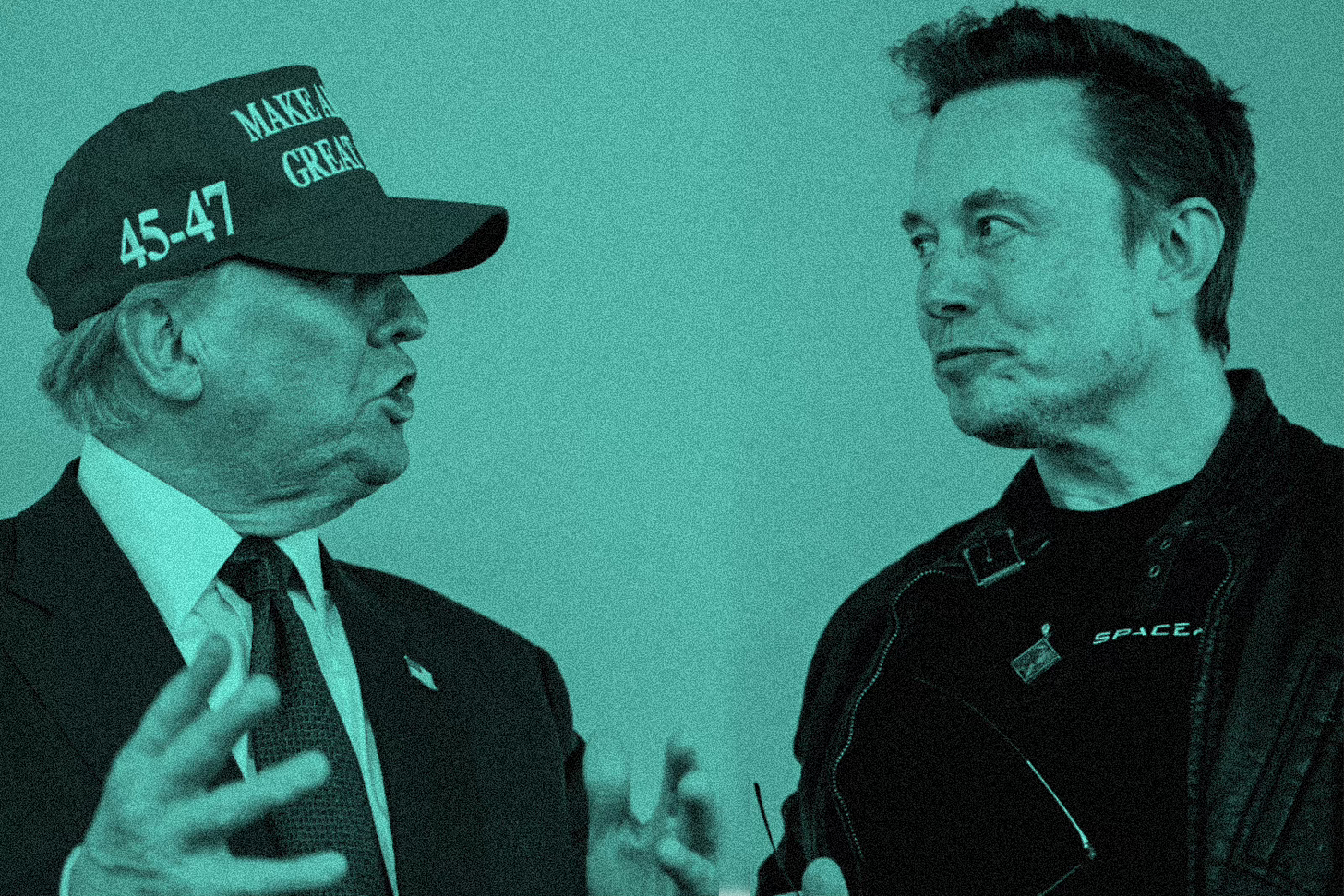Musk Might be the First Domino to Fall in Trump’s Unwieldy MAGA Coalition
Now that Trump has to govern, his massive political vulnerabilities are becoming apparent
Earlier this month, the great Redpill Rupture of our time almost happened.
For one glorious week—roughly starting on June 3rd and lasting until the 9th—Donald Trump and Elon Musk, the two most significant figures in Republican politics, found themselves on a spectacular collision course that threatened to shatter the MAGA coalition. Although the two pulled back from the brink, the spat presented yet further confirmation of the instability at the heart of Trump’s political movement.
A lot of the commentary on this short-lived feud focused on who won the war of words, as if this were a rap battle rather than a power struggle of immense political consequence. But the major takeaway from this episode is not who landed more devastating insults or “who owned whom”—it’s the right’s coalitional fragility.
Trump’s Ephemerality
There is no question that, on the right today, Trump enjoys unrivaled control and influence. And because MAGA is a cult of personality, Trump is also the movement’s organizing principle—the cohesive agent binding together the right’s otherwise disparate strands. That’s what Musk missed when he dismissively said: “Trump has 3.5 years left as President, but I will be around for 40+ years.”
Time will tell whether, and to what extent, there will be Trumpism without Trump—whether the MAGA movement persists once its central reference point is gone. But what Musk’s self-serving statement—a follow-up to his declaration that Trump wouldn’t have won the 2024 election without him—got right is that Trump is far from invincible, that he is rapidly approaching his political expiration date, and that the right’s ongoing success depends on a number of factors, not just the personal magnetism of a single individual.
To put the point more starkly: As a term-limited, late-stage septuagenarian with underwater approval ratings, a razor-thin majority in the House of Representatives, a series of significant slip-ups on his watch mere months into his second term, a fractious and factional governing coalition, and a referendum on his tenure in the form of midterm elections less than a year and a half away, Trump’s hold on power is far more precarious than many believe.
What Musk Means To MAGA
That is precisely why Trump is very fortunate that his row with Musk did not go any further after reaching the stratosphere rhetorically, primarily due to Musk, who variously:
predicted that Trump’s tariffs would trigger a recession;
suggested a sinister connection between Trump and Jeffrey Epstein, the man a judge once called “the most infamous pedophile in American history”;
pledged to “fire all politicians” who supported Trump’s budget bill, which he also called a “disgusting abomination”;
called Trump a liar;
threatened to create and bankroll a rival political party;
declared that SpaceX would decommission its Dragon spacecraft in retaliation to Trump’s threats to cut off his federal contracts;
resurfaced Trump’s past posts on the urgent need to curb debt and deficits that contradict his present stance, demonstrating the president’s flagrant political hypocrisy;
called for Trump to be impeached a third time.
Musk later issued an apology to Trump—both privately and publicly. Certainly, for a figure as unabashedly edgelordian as Musk, who hails from a political culture utterly allergic to displays of remorse or guilt, his acknowledgement on X that he “went too far” and his attempts to patch things up with the president reflect just how formidable a figure Trump is. Mea culpas are simply not Musk’s thing!
But those who interpreted Musk’s walk-back as conclusive proof that Trump had swatted away the world’s richest man as if he were a household pest failed to appreciate just how scathing Musk’s remarks were. His barrage was easily the most aggressive attack Trump had ever faced from an ideological ally. So when Musk issued his apology, which was actually quite qualified and tepid, that wasn’t merely a reflection of Trump’s might but also of the blistering nature of his brief blitz against the president. (In fact, Musk is already reigniting a low-level war this week by accusing a Trump aide, ironically enough, of committing a federal crime by lying on a security clearance form.)
On the right, there is no one quite like Musk. He is a MAGA icon, a right-wing discourse baron in control of the movement’s preferred social media platform, and, most significantly, a Republican superfunder. Trump had previously waged war against figures who had one of these features—but never someone with all three.
In the run up to the 2024 Republican presidential nomination, Trump decisively routed Florida’s Gov. Ron DeSantis, an ideological darling of the new right. He has routinely ripped into Fox News, beating back Rupert Murdoch’s attempts to “pivot” away from Trump and render him a “non-person” with remarkable ease. In 2016, he rendered the entire right-wing donor class inert, forcing much of it to ultimately back him after crushing its preferred candidates and seizing the nomination. But Musk is all three of these in one—which goes some distance toward explaining why Trump’s response to Musk’s rhetorical onslaught was muted, relative to his past reactions. He has yet to come up with an insulting nickname for Musk like Little Marco and Ron DeSanctimonious. Trump is acutely aware of Musk’s unique power as kingmaker on the right.
Sure, Musk had little to gain, and a lot to lose, from squaring off with Trump—and the incentives in place always suggested that a détente would come. Musk could hardly ignore Trump’s threats to turn off the faucet of federal subsidies and government contracts that his companies don’t merely benefit from but often rely on.
However, Musk could instantaneously lose 99% of his $400+ billion net worth and he would still be billionaire several times over. Trump cutting off Musk’s companies from government subsidies and contracts—a move that the White House has already pooh-poohed—would undoubtedly be a major blow. But in the case of Musk’s biggest beneficiary, SpaceX, which has received over $20 billion from federal contracts, it’s not even clear that the government could do so. A CNN report concluded that replacing SpaceX “is not realistic,” since “there is no other company available to replace it.”
On the other hand, if Musk put his full weight behind opposing Trump, he could do real damage to the president. Trump entering into a protracted war with Musk would guarantee that his megaplatform, money, and MAGA influence get repurposed as tools to help Trump’s opponents. Contrary to Team Trump’s constant claims, the 2024 election was far from a landslide. And given that Trump has not consolidated support since becoming president, a scorned Musk actively looking to thwart Trump’s agenda would represent a nightmare for the White House.
Musk’s claim that Trump wouldn’t have won in 2024—and that the House would be under Democratic control—without him is pure conjecture. But what we can be certain of is that, if Musk wanted to, he could meaningfully degrade the Trump-led Republican Party in multiple ways.
The Fragility of the MAGA Coalition
But a prolonged war with Musk would have been really bad for Trump in ways that go beyond the tech mogul using his influence, platform, and wealth to weaken the president politically. It also would have heightened the structural vulnerabilities in Trump’s coalition as he tries to govern.
Because Trump’s ongoing presence atop our politics depends on his ability to hold together disparate and even clashing interests—something largely obscured when out of office—his hold on power is on shakier ground than many imagine. Musk going on the warpath against Trump would exploit and expose the brittle nature of Trump’s coalition by exacerbating its current divisions and infighting.
That’s because Trump’s coalition is an uncomfortable mix of America First isolationists, ethnonationalists and nativists, social conservatives and tradpilled extremists, economic populists, fiscal hawks/libertarians, and globalization-dependent tech bros. For years, the glue that kept it all together was Trump’s capacity to unite these disparate factions under a shared hatred of Democrats and the woke left. That’s what Trump rode to victory against Hillary Clinton in 2016 and Kamala Harris in 2024. But that’s a campaign strategy not a governing agenda—and far easier to pull off as the party on the outside looking in. Political disempowerment has a way of focusing energies toward the common goal of toppling the rival party; subgroups and factions paper over differences in order to mount a successful campaign against the other side. The realities of governing, however, thrusts these differences out into the open as a president is forced to pick between them and decide whom to prioritize. The predictable result is a heightening of the tensions that were previously suppressed in order to win back power.
So it’s no surprise that the hissy fit that Musk and his fiscal-hawk allies in the House Freedom Caucus threw in early June over the One Big Beautiful Bill had barely died down when another fight erupted, this time over U.S. involvement in Israel’s war on Iran. MAGA’s pro-Israel faction is squaring off against isolationist America First hardliners. As The Daily Beast’s Farrah Tomazin reports, Trump is having a hard time staving off a civil war over this issue. Tucker Carlson, an ardent anti-war isolationist who last time around talked Trump into returning flights that were en route to bombing Iran, is apoplectic now about the prospects of U.S. military strikes, suggesting it would spell “the end of American empire.” A heated Carlson interview with Texas Sen. Ted Cruz spilled the hostilities between the pro-Israel and isolationist factions out into the open.
These are far from the only cracks in the conservative coalition. Recall the intra-MAGA rift between Musk, the globalist, and Bannon, the populist nativist, that erupted before Trump’s second term had even begun. Musk, who is dependent on high-tech foreign labor, wants more skilled immigration that Bannon, along with Trump’s de facto White House immigration czar, the ultra-nativist Stephen Miller, adamantly oppose.
Trump initially tried to split the baby by handing Musk control over DOGE while letting Miller unleash his reign of terror on undocumented immigrants and refugees whom Musk was only too happy to throw under the bus during the campaign. But this slicing and dicing approach to governance has limits and at some point you must pick a side. And it is pretty clear that Trump is not picking Musk’s given that on free trade too Musk has lost roundly to Trump’s ardent and abiding love for protectionism.
All of this is to say: Had Musk’s tiff with Trump, based on these and other frustrations, lasted longer and ultimately grown irreparable, Musk could have meaningfully jeopardized Trump’s political prospects simply by exploiting the vulnerabilities that come with having to govern. He could have given lots of aid and comfort to the fiscal hawks in the House opposing Trump’s budget bill, which ultimately passed by one vote. He could have convinced fellow tech billionaires to use their wealth to oppose Trump, or at the very least to withdraw their support for him. He could have subjected him to a relentless barrage of attacks on the right’s favorite platform, inexorably influencing some currently loyal followers to become disaffected defectors. He could have platformed and bankrolled right-wing reformers who generate grassroots energy toward depicting Trump as having sold out to establishment interests and becoming just another swamp creature.
The White House is obviously acutely aware of Musk’s capabilities having relied on them itself. After all, it weaponized Musk as a way of ensuring compliance with MAGA priorities. It sicced Musk on anyone with an R next to their name who flirted with voting against the president’s nominees. In the early days of Trump’s second term, The Hill reported that sitting GOP senators were “terrified over the prospect of facing primary challengers funded by Elon Musk if they stick their necks out by opposing President Trump’s agenda.”
An Elon Musk committed to taking the fight to Trump would have inevitably peeled off a few layers of Trump support and exacerbated the divisions that currently exist within his coalition. But even a Musk no longer interested in lifting a finger to help Trump is likely a big blow.
Trump is the undisputed leader of the right—but that does not mean he is not weak. And his weakness will likely grow as he governs.
© The UnPopulist, 2025
Follow us on Bluesky, Threads, YouTube, TikTok, Facebook, Instagram, and X.
We welcome your reactions and replies. Please adhere to our comments policy.







I'd say Tucker Carlson is more anti-democracy than anti-war. Putin's invasion of Ukraine isn't just okay with him, it eventually led him to visit Moscow, gush about the wonderfulness of all things Russian, and interview Putin himself (who reciprocated with favorable talk of Tucker Carlson in the Russian media ― Tucker claims other journalists refused to interview him, but in reality Putin turns down real journalists.)
So many words, ifs and and buts. What we see with our own eyes and hear from the voice of so-called power, Mr. Trump negates every sentence in the concept of the his fall being in question. The settings for Trump's outreach to the public now has demonstrated his unfortunate brain decay and difficultly with ordinary discourse, let alone any conception of wasted time talking flippantlly about real wars like he thinks they're fantasies that he can play with for two weeks, while he pays for flag poles to be erected (the shameful word? he couldn't say in public that is not sexual) though his mental frame disallows it to be an actual verb for building things. Bless the poor soul, but use the 25th amendment to the Constitution already. VP is a rabbit in a rat's costume. He'll be awful and manipulative, but he cannot, nor Trump, succeed in '28. The Democrates have good talent in leaders already in place that get both sides' vote. All governors with stable and strong minds who can fix issues rather than play with their and other people's e-word parts. Onward USA and our 3-tiered governing establishments, and our 250-year history of rule by the people. This is nonsense, what we have to see and hear from fighting babies. And the meandering mind of a man with onset dementia whose family claps while he clammers for what is already lost on him.